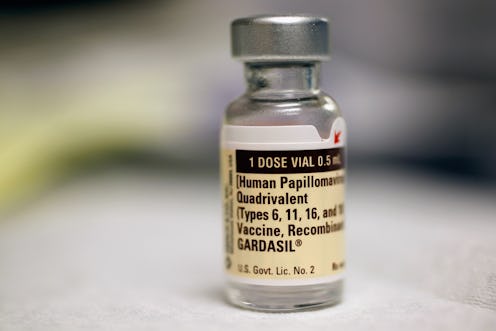News
HPV Vaccine's Added Perk (If You're White)
A new study out of Costa Rica found that just one of the three suggested doses of the HPV vaccine could be more effective than scientists thought — but only points to benefits for the strains most commonly contracted by white women. Scientists tracked the antibody levels of women who'd received one, two, or all three of the Cervarix vaccine shots during the course of four years, and and found that no matter how many doses the women had received, their production of HPV-fighting antibodies remained stable. Furthermore, women who'd had just the one shot still had an immune response to the virus that was five to nine times stronger than women who were infected already.
Of course, antibody levels were lower in the women who only received one dose, which is keeping scientists cautious. Because the vaccine is so new, scientists don't know yet how many doses — if fewer than the prescribed three — would be "enough" to protect women completely from the virus. (So ... probably good to go with all three.)
"We don’t know what the minimum required [antibody level] might be for protection," said study researcher Mahboobeh Safaeian, of the National Cancer Institute. However, "the fact that [antibody levels] remained higher than natural infection, and remained stable, is a promising finding."
Eighteen-to-26-year-old women who fall within the age group recommended for the vaccine certainly shouldn't count on a one-dose'll-do-it strategy just yet: The study was relatively small; used only Cervarix; and a bigger sample is needed before anything can be firmly concluded.
Not to mention, Cervarix only protects against HPV strains 16 and 18, which are the strains most commonly found in white women. A study published a week ago found that the vaccine— alongside competitor vaccine Gardasil — doesn't protect black women from the strains of HPV they're most likely to contract. With the evidence as it stands— and no vaccine yet targeting the strains most commonly found in African-American women — it's hard to say that it's beneficial across the board. As Bustle reported last week:
Right now, current HPV vaccines mainly target the subtypes 16 and 18. They’re the ones that most commonly cause cervical cancer, but they’re both also most frequently found in white women — they only show up half as often in African-American women. Gardasil also targets strains 6 and 11, but neither are as common in either group.
It could help explain why, despite the vaccine, African-American women are 20 percent more likely to be diagnosed with cervical cancer. Or, given the drug’s relatively recent entrance onto the pharmaceutical market, it also raises serious red flags for vaccine manufacturers and the breadth of such medications’ coverage.
There is some good news: a new HPV vaccine is in the third phase of clinical trials, and is intended to target seven other cancer-linked subtypes.
Well, we should certainly hope so. Stay tuned for more, we'll be investigating.
